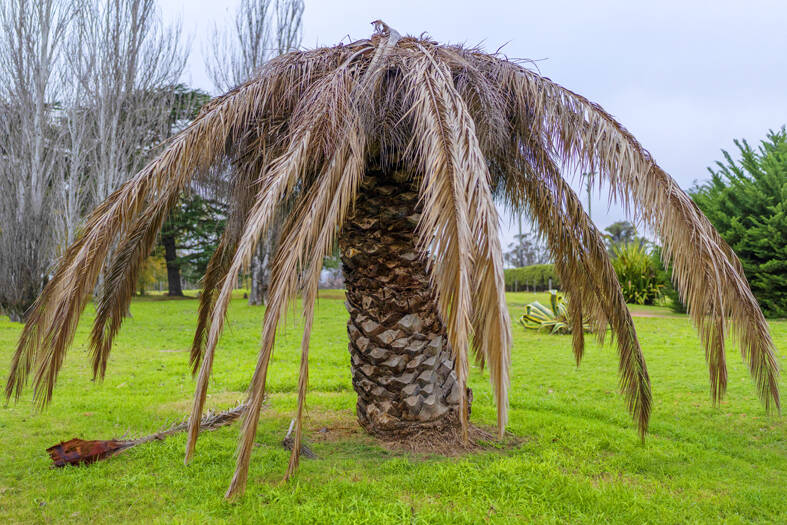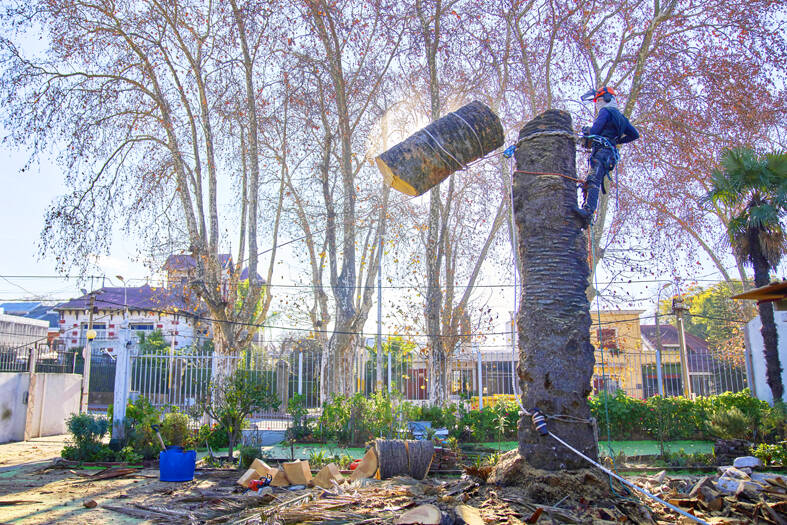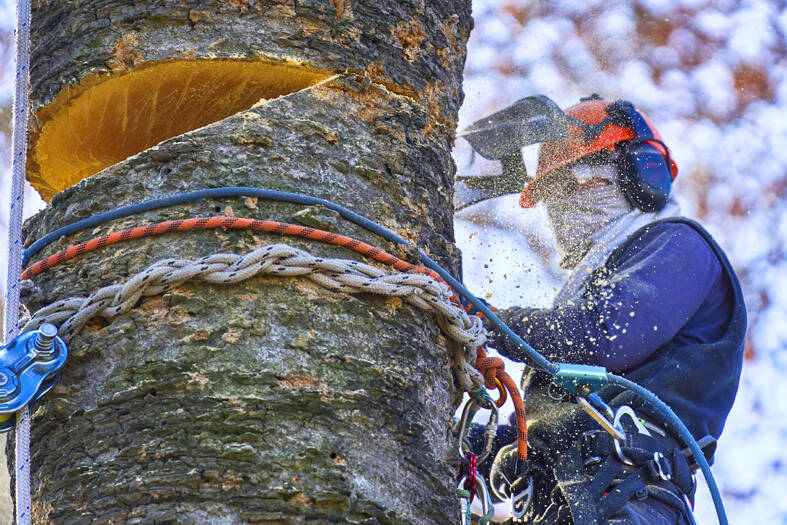Palm trees in Uruguay are more than just plants, they are icons, much like olive groves for Greeks or cherry blossoms for the Japanese.
The treasured trees lining one of the world’s longest sidewalks through Montevideo, Uruguay’s capital, and adorning the swanky Atlantic beach resorts of Punta del Este have recently come under ruthless attack.
Across the small South American country, palm trees are falling prey to a fierce enemy measuring just 5cm in length: The red palm weevil.

Photo: AP
First the elegant fronds droop. Then the tell-tale holes appear in the trunk. Soon enough, the tree is tilting toward collapse.
The weevil has devoured thousands of Uruguay’s palm trees since its unexplained arrival from Southeast Asia in 2022, but authorities are only now waking up to the threat as the landscape of municipalities transforms and fears grow that the country’s beloved palms could be wiped out.
“We are late in addressing this, but we are doing so with great commitment and seriousness,” Estela Delgado, the national director of biodiversity at Uruguay’s Ministry of Environment, said last month.

Photo: AP
The insect and its devastating impact can be found in 60 countries around the world, but nowhere else in South America.
Authorities first detected it in the town of Canelones, bordering Montevideo, where the insect killed more than 2,000 palm trees in less than a month.
Weevils quietly wreak destruction by boring through the open scars of pruned palms and laying hundreds of eggs inside. When larvae hatch, they tunnel through trunks and eat the trees’ internal tissue. Death strikes within weeks.

Photo: AP
The Uruguayan government in March set up a task force to combat the plague.
In May, Uruguayan Minister of the Environment Edgardo Ortuno declared the fight against the red palm weevil “a national priority.”
As of this year, the red bug has proliferated in eight of the country’s 19 regions, including Montevideo.
Half of the capital’s 19,000 palm trees have been infected, said Gerardo Grinvald, director of pest control company Equitec, which helps authorities combat the bug.
The insect first attacks decorative Canary palms, the tree in so many pictures of Uruguay’s sunny landscape, before moving onto its date palms.
“It’s an invisible pest,” Grinvald said, explaining the challenge of identifying an infestation when it starts.
As a result, landowners fail to isolate and quarantine their trees, fueling the weevil’s crawl across the country.
The Montevideo municipality this year earmarked US$70,000 for chemical pesticide sprays and insecticide injections meant to kill bugs inside infested trunks, with the goal of saving about 850 trees in the city’s prominent Parque Rodo, a scenic urban park along the coast.
In the southeast corner of Uruguay, home to Punta del Este, a beachy, palm-fringed haven for jet-set elites from all over the world, authorities recently allocated US$625,000 for efforts to dispose of infected trees and lure weevils away from affected areas with pheromone traps and other methods.
“We are losing our palm trees,” Montevideo resident Rafael dos Santos said as he walked his dog in Parque Rodo. “They are historic in Uruguay, and a part of us.”
As the weevil’s march continues unabated, authorities fear that native trees of Uruguay’s UNESCO biosphere reserve bordering Brazil would fall victim next, potentially facilitating the spread of the parasite across an unprepared continent.

DEADLOCK: Putin has vowed to continue fighting unless Ukraine cedes more land, while talks have been paused with no immediate results expected, the Kremlin said Russia on Friday said that peace talks with Kyiv were on “pause” as Ukrainian President Volodymyr Zelenskiy warned that Russian President Vladimir Putin still wanted to capture the whole of Ukraine. Meanwhile, US President Donald Trump said that he was running out of patience with Putin, and the NATO alliance said it would bolster its eastern front after Russian drones were shot down in Polish airspace this week. The latest blow to faltering diplomacy came as Russia’s army staged major military drills with its key ally Belarus. Despite Trump forcing the warring sides to hold direct talks and hosting Putin in Alaska, there

North Korea has executed people for watching or distributing foreign television shows, including popular South Korean dramas, as part of an intensifying crackdown on personal freedoms, a UN human rights report said on Friday. Surveillance has grown more pervasive since 2014 with the help of new technologies, while punishments have become harsher — including the introduction of the death penalty for offences such as sharing foreign TV dramas, the report said. The curbs make North Korea the most restrictive country in the world, said the 14-page UN report, which was based on interviews with more than 300 witnesses and victims who had

COMFORT WOMEN CLASH: Japan has strongly rejected South Korean court rulings ordering the government to provide reparations to Korean victims of sexual slavery The Japanese government yesterday defended its stance on wartime sexual slavery and described South Korean court rulings ordering Japanese compensation as violations of international law, after UN investigators criticized Tokyo for failing to ensure truth-finding and reparations for the victims. In its own response to UN human rights rapporteurs, South Korea called on Japan to “squarely face up to our painful history” and cited how Tokyo’s refusal to comply with court orders have denied the victims payment. The statements underscored how the two Asian US allies still hold key differences on the issue, even as they pause their on-and-off disputes over historical

Decked out with fake crystal chandeliers and velvet sofas, cosmetic surgery clinics in Afghanistan’s capital are a world away from the austerity of Taliban rule, where Botox, lip filler and hair transplants reign. Despite the Taliban authorities’ strict theocratic rule, and prevailing conservatism and poverty in Afghanistan, the 20 or so clinics in Kabul have flourished since the end of decades of war in the country. Foreign doctors, especially from Turkey, travel to Kabul to train Afghans, who equally undertake internships in Istanbul, while equipment is imported from Asia or Europe. In the waiting rooms, the clientele is often well-off and includes men